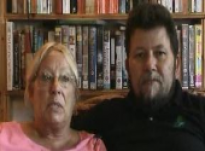Interview 07- Intensive care: family experiences

Their son was admitted to ICU in 2005 with bacterial meningitis. It was a traumatic time but he is now back home and has made excellent progress.
Father: Company director. Mother: Retired NHS manager. They are married and have three adult children. Ethnic background/nationality: White British.
For more clips from this interview click here.
More about me...
They were shocked when a nurse asked them, in a roundabout way, to consider turning off their son's life support. They were 'grateful' to be contacted by his consultant later who told them that was not the only option.
They were shocked when a nurse asked them, in a roundabout way, to consider turning off their son's life support. They were 'grateful' to be contacted by his consultant later who told them that was not the only option.
Mother - They kept him [son] sedated for about five days and then decided to bring him round again and do another CT scan. He was still fairly agitated, and the CT scan showed multiple infarcts across the entire surface of his brain. Now this was about eight days in to the attack, to a point where I thought in my ignorance that he had survived and therefore he would survive. I thought he was desperately ill, but I thought he was safe. When they had the second CT scan, actually the third, because they took one in the first hospital, but the second one at that ITU, they sent it to the regional centre for an opinion. And the opinion was that he could not survive. But if by chance he did, he would be in a persistent vegetative state.

